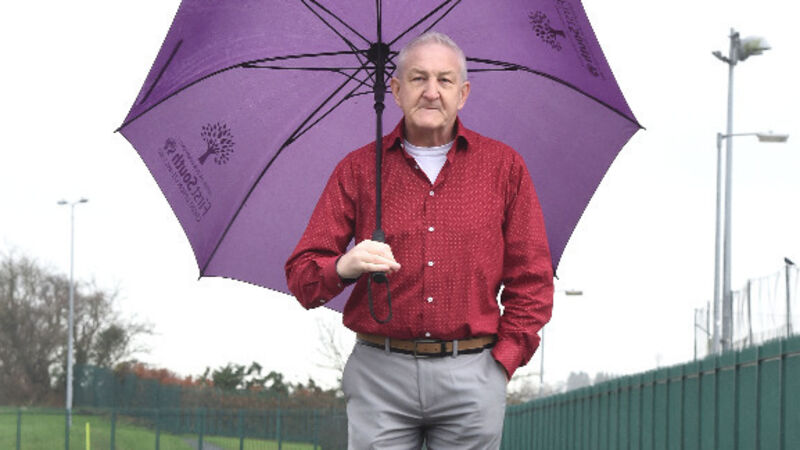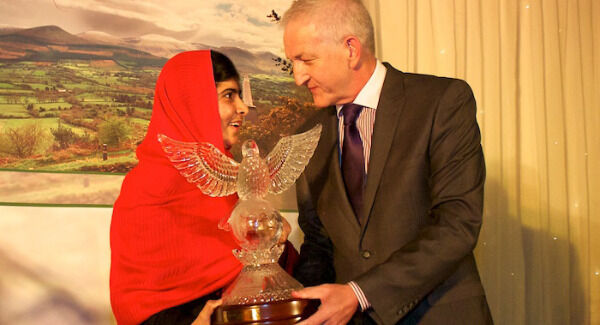Martin Quinn was inspired by Malala when recovering from stroke

Martin Quinn suffered a stroke as he was preparing to welcome the famous Pakistani teenager to Ireland. Her brave attitude to life helped Martin with his own recovery process.
Around this time five years ago I suffered a stroke which had a profound impact on my life. It was a seismic event which I will forever associate with Pakistani teenager, Malala Yousafzai.
It was while I was commencing a radio interview on Tipperary Mid-West Radio about the future Nobel Peace Prize winner that I suffered the stroke and which left me unable to answer the interviewer’s questions in a coherent manner and may have given the impression to listeners that I was ‘inebriated’, even though it was just 10am in the morning.
The interview was cut short and I went home alone and unwell and unsure of what was happening to me.
Though many had heard the interview and knew that something was amiss, still no one contacted me and it was the following day before I was admitted to hospital, after my condition had deteriorated and I was unable to speak or stand unaided.
I was doing the interview to announce that Malala was being awarded the Tipperary International Peace Award.
She had left for dead after having been shot in the head by the Taliban in 2012 and was recovering from the attack in hospital in England.
I was inspired by Malala’s courage, conviction and determination. Her recovery proved to be an inspiration to me in my fight to regain my speech and my independence.
I became more determined when a well meaning visitor to my hospital bed remarked that I would be unable to deliver a speech for the presentation of the Tipperary International Peace Award.
I vowed to myself that day that I would deliver the speech when Malala came to Tipperary. And so in August of that year, Malala did arrive in Tipperary with her father Ziauddin.
I had been recovering well and had worked very hard with the speech and language therapist Yolane Fenton, to ensure that I could deliver the speech.
I had, however, to deal with an obstacle that had come in my way when my consultant at Cork University Hospital told me that I was to be admitted immediately for further tests.
I refused to be admitted, explaining to the consultant that I had a very important visitor arriving and I had a speech to deliver!
So my colleague John Shanahan and myself arrived at Shannon Airport to greet our visitors.
There were no media present so there wasn’t any fuss or bother, and indeed we both remarked that it was somewhat surreal to be there waiting to welcome such a famous person.
They came through arrivals with all the other passengers and we all greeted each other warmly.
In conversation later on our way to Tipperary, John told Malala and her Dad about my stroke and my recovery, and myself and Malala compared notes about learning to speak again (as Malala lost her speech and her hearing following the shooting).
She said to me that she was now known as the girl who was shot by the Taliban.
“But I don’t want to be known as the girl who was shot by the Taliban. I want to be known as the girl who fought for the rights of every child, girls and boys, to the rights of education and equality,” she said.
She said that education was her goal and that she wanted every boy and girl to go to school.
On arrival in Tipperary, I took the opportunity to go back over my speech and to recap on what my speech therapist had advised.

I even managed to do some media interviews prior to the award presentation and unlike seven months previous, on this occasion I did so without fault.
I then went on stage and delivered a speech, also without fault, in the presence of Malala, her Dad and hundreds of people.
I had come a long way since the stroke seven months previously and while I was overjoyed at achieving that milestone I was blown away listening to Malala deliver an inspiring address, which she concluded with the words “It’s a long way to Tipperary – It’s a long way to Peace”.
I knew that day that I was in the presence of a remarkable young person who would one day go on to leave a major mark on world history. I was honoured to be in her presence and delighted that she inspired me on the road to my recovery.
My recovery was going to take time and perhaps too quickly I returned to my work as an assistant supervisor with a Community Employment Scheme.
However, I struggled greatly with cognitive, concentration and memory issues, along with fatigue. I eventually, in consultation with my GP and Consultant, had to retire on health grounds.
It is a very difficult transition to go from working to retirement (physically, mentally and financially) but I knew that I was no longer able to continue working.
I am also dealing with another diagnosis for an illness which I am told is unrelated to the stroke.
I have, however, kept myself occupied in a wide range of community work which gives me great satisfaction.
Some of it can be stressful at times but I try to manage it as best I can.
I am also working on a book about my life, my love of community and the organisations I am involved in, and on stroke and recovery.
The students of St Ailbes’ School in Tipperary Town have been assisting me with interviewing and recording.
Life after stroke is never the same and certainly not easy but there is great support out there with a network of stroke survivor groups and Aphasia groups around the country and a new national group, United for Stroke Irish Heart Foundation, for the younger stroke survivors.
These are all invaluable for those of us dealing with post-stroke issues. We can all inspire each other on the road to recovery such as how I was inspired by Malala.
So, on the five year anniversary of my stroke, I still have to deal with post-stroke issues, but I am grateful for the inspiration of Malala and for the support of my family and of so many friends and colleagues.










